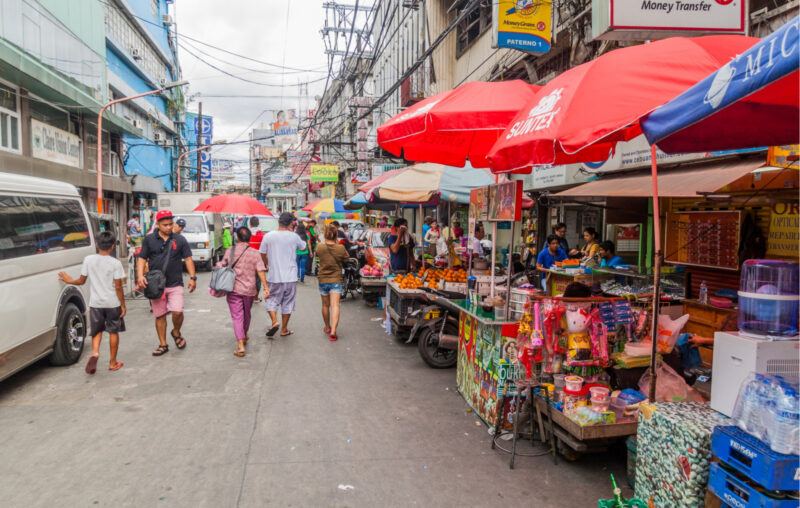The Resilience and Brilliance of the World’s Poorest: The Case of Pagpag

Global poverty has been falling dramatically over the last few decades, but a lot of people in the world still live in conditions that are absolutely appalling by the standards of the developed world. We insult them, though, by seeing them as mere victims or by blaming them for their plight when, for most of the poor people throughout history, they have been poor because they have lost the time-and-space lottery. The problem isn’t that the world’s poorest don’t work hard. The problem is that they work hard in societies where restrictions on economic freedom throttle growth.
The resourcefulness and work ethic of the world’s poorest continue to amaze me. The poorest people in the world scrape by on the income they earn from recycling scraps they find in garbage dumps. They also recycle discarded food. A few years ago, I learned about pagpag, which is food gathered from the garbage, washed, recooked, and sold. Who are pagpag customers? They’re people who are too poor to afford fresh meat (but it’s a minor miracle that the poorest of the poor can afford to eat meat of any kind regularly). There is, therefore, a thriving market in the slums around Manila for literal cooked garbage. People earn about $4-$6 per day in the pagpag trade and servings of pagpag costs sixty cents or less.
Revolting? Yes, by the standards of rich Westerners who make enough money that they don’t have to dig through the garbage for scraps. Pagpag is an entrepreneurial market response to desperate circumstances, and while I’m sure the market doesn’t work perfectly (relative to the perfectly competitive models we teach students in introductory economics classes), it seems to work pretty well. The poor, importantly, are not stupid. They’re just poorer, and many of them are poor because they lost the geographic lottery and were born on the wrong side of a border. In a BBC video on pagpag, an ice deliveryman explains that he buys from a particular vendor named Noberto because he “makes clean ‘pagpag’”, which is “why more people buy from here” at twenty cents per bowl. He “eats pagpag “because it’s tasty” but notes that “it’s about having a strong stomach.” Obviously: it looks delicious, but I can only imagine what it would do to my tender American digestive tract.
He notes, though, that pagpag is “what the poor can afford.” How can we help this deliveryman and others like him? We could inspect and regulate Noberto’s restaurant. We could crack down hard on illegal pagpag sales. None of this, of course, would help the people we wish to help. As David Henderson has pointed out, you don’t help people by taking away from them the choices they make. You help them by expanding their options. One video points out that one of the issues some activists are running into is that parents are not willing to spend more to buy higher quality food. From where I sit, one could think, “This looks irresponsible, and I should intervene to change it!” I believe, though, that we would do well to think parents on the ground intimately acquainted with the particular circumstances of time and place are in a better position to know what is best for their families than someone like me watching YouTube videos on the other side of the world.
Something struck me in watching YouTube videos about pagpag and the foodways of the very poor in places like Bangkok (search for “slumfood millionaire” on YouTube). It is interesting that even among the poorest of the poor who are eating discarded and reclaimed fast food leftovers, flavor and presentation matter. People care about quality and they care about aesthetics, as Virginia Postrel has pointed out in her book The Substance of Style. In every society, no matter how poor, people still ornament themselves and pay a little extra for food that tastes good.
I’m not saying that the poor should quit complaining, eat our garbage, and be happy with it. They can’t feed their children with our good intentions and righteous indignation. They need real resources. Pagpag and similar foodways illustrate a harsh reality and people’s resilience in the face of the greatest difficulties. It suggests to me that the world’s poor could do fine, thank you very much, if we weren’t actively keeping them from doing so by forcing them to stay on the other side of a border (here’s Michael Huemer’s argument for why there is a right to immigrate and why it is morally blameworthy to forcibly keep the world’s poor from cooperating with willing employers, landlords, merchants, and others who happen to be on the other side of the border).
My stomach turns thinking about eating dishes made from what’s in the dumpster behind McDonald’s. I’m grateful that I have more options and more than a little ashamed at my tendency to take these incredible blessings for granted. Instead of watching a few documentaries on YouTube and thinking “Wow, that’s too bad; someone should do something for those poor people,” we might do better to see how resourceful and hard-working people can be in even the most desperate circumstances and start looking for the institutional impediments (the absence of economic freedom, basically) that actively prevent the poor from improving their circumstances.










